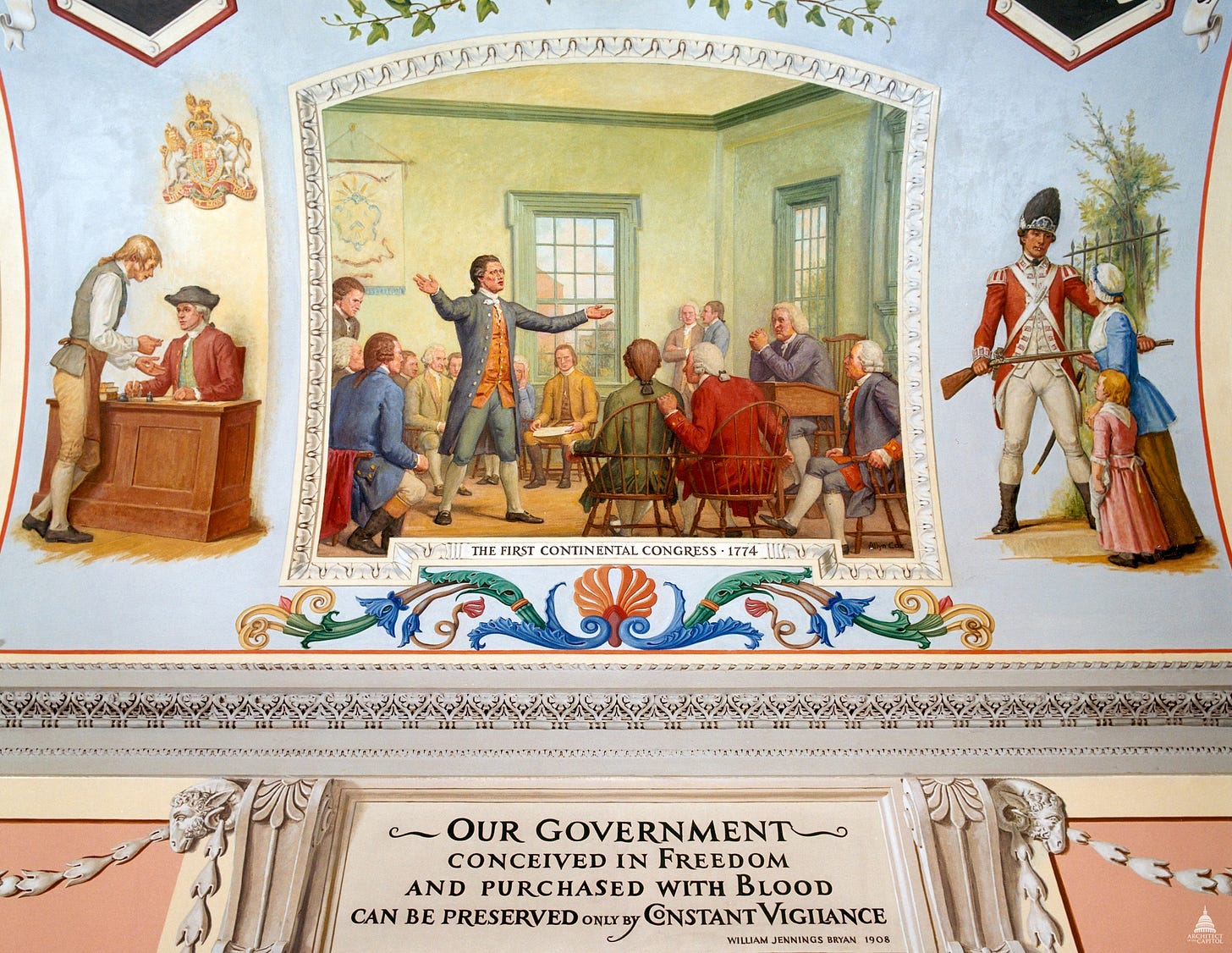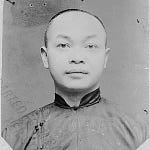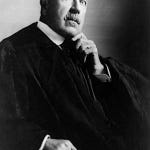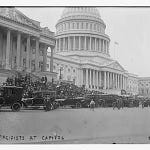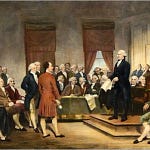This Day in Legal History: First Continental Congress
On September 5, 1774, the First Continental Congress convened in Philadelphia, marking a critical early step toward American independence. Delegates from twelve of the thirteen colonies—Georgia being the sole exception—gathered at Carpenters’ Hall to coordinate a colonial response to the "Intolerable Acts," a series of punitive measures imposed by the British Parliament in the wake of the Boston Tea Party. These acts, which included the Boston Port Act and the Massachusetts Government Act, were seen by the colonists as severe violations of their rights as Englishmen.
The Congress brought together influential figures such as George Washington, John Adams, Samuel Adams, Patrick Henry, and John Jay. Though the colonies had differing interests and levels of loyalty to the Crown, the delegates united in their desire to assert colonial rights through collective action. They adopted the Suffolk Resolves, endorsed a boycott of British goods through the Continental Association, and agreed to reconvene the following year if their grievances were not addressed.
Rather than immediately pushing for independence, the First Continental Congress aimed to restore harmony with Britain while defending colonial autonomy. It drafted a Declaration of Rights and Grievances, emphasizing allegiance to the Crown but rejecting parliamentary authority over the colonies in matters of internal governance.
This Congress laid the groundwork for future intercolonial cooperation and demonstrated that the colonies could act in concert. Its organizational structure, with committees and formal resolutions, prefigured the eventual legislative model adopted under the U.S. Constitution. While King George III and Parliament ultimately ignored the Congress’s petitions, the gathering significantly escalated the political crisis that would lead to the American Revolutionary War.
Supreme Court Justice Amy Coney Barrett said this week that, despite political polarization and President Trump’s aggressive use of executive power, the U.S. is not experiencing a constitutional crisis. Whew! Speaking at New York’s Lincoln Center while promoting her new book, Listening to the Law, Barrett emphasized that the Constitution is “alive and well,” and that American institutions—particularly the courts—are still functioning effectively. Her remarks come amid widespread concern over Trump’s second-term policies, including sweeping immigration crackdowns, tariff impositions, and rollbacks of diversity programs, many of which have been challenged in court.
Federal judges have repeatedly halted or delayed Trump’s initiatives, leading to sharp criticism from the president. Earlier this year, Trump even called for the impeachment of a federal judge, raising alarms among legal scholars. Despite these tensions, Barrett asserted that a real constitutional crisis would require the collapse of the rule of law—something she doesn’t see happening.
Barrett also defended her controversial vote to overturn Roe v. Wade in 2022, arguing that Supreme Court decisions shouldn't be influenced by shifting public opinion. While support for abortion rights has grown in recent years, Barrett stood by the Court’s direction, which has taken a decisively conservative turn since her appointment in 2020. Her comments signal confidence in the judiciary’s resilience during politically charged times.
Supreme Court's Barrett says US not in constitutional crisis | Reuters
U.S. prosecutors are aggressively charging individuals in Washington, D.C. with assaulting or resisting federal officers under a new DOJ-led law enforcement push, but the initiative is drawing scrutiny due to its stark contrast with President Trump’s earlier decision to dismiss or pardon many January 6-related assault charges. A Bloomberg Law review found at least 20 new federal cases that closely resemble charges from the Capitol riot—charges that Trump has largely wiped away. Critics argue that this inconsistency undermines prosecutorial credibility and raises concerns about politicization of the Justice Department.
Some judges and grand juries have echoed that skepticism. In one case, a magistrate judge cited the Jan. 6 clemencies in deciding not to detain a man charged with threatening a National Guard member. Prosecutors have also struggled to secure felony indictments, including in a case where a former DOJ employee was accused of throwing a sandwich at a federal officer. These outcomes point to juror reluctance in cases they may view as politically selective.
U.S. Attorney Jeanine Pirro is leading the local effort and has acknowledged the difficulty of securing convictions. Some cases involve more serious allegations—kicking, hitting, or spitting on officers—while others stem from lower-level confrontations, including a disputed video involving immigration agents.
Meanwhile, defendants and defense attorneys are raising claims of selective prosecution, citing the dismissal of hundreds of Jan. 6 assault cases still pending when Trump returned to office. One high-profile example involves Rep. LaMonica McIver, whose lawyers argue her case—stemming from a confrontation with immigration officers—is being pursued for political reasons. Prosecutors have already been forced to downgrade multiple cases from felonies to misdemeanors due to lack of support from grand juries.
DOJ Crime Crackdown Clashes With Jan. 6 Cases Trump Forgave
A federal appeals court has temporarily blocked a lower court’s ruling that would have restricted President Trump’s use of military troops for immigration enforcement and crowd control in Los Angeles. The move preserves Trump’s authority to use active-duty military and National Guard personnel in support of federal agents while the case is under appeal. The original ruling, issued by U.S. District Judge Charles Breyer, found that the administration had violated the Posse Comitatus Act, a law dating back to the 1800s that limits military involvement in domestic law enforcement.
Breyer’s decision, which would have barred military personnel from performing police functions in California, was scheduled to take effect on September 12 but is now on hold as the 9th Circuit reviews the appeal. The legal fight stems from Trump’s June deployment of over 4,000 National Guard members and 700 Marines to Los Angeles during protests over federal immigration policies. Though most of the protests have since calmed, around 300 National Guard troops remain on the ground, supporting immigration and drug enforcement operations.
Critics argue that Trump’s use of the military in civilian law enforcement roles marks a dangerous shift in executive power. The same day the 9th Circuit paused Breyer’s ruling, Washington, D.C.'s attorney general filed a lawsuit challenging similar military deployments in the capital. Trump has also signaled interest in expanding military involvement to other cities like Chicago and New Orleans.
US appeals court pauses restrictions on Trump's use of troops in Los Angeles | Reuters
Google has been hit with a $425 million jury verdict in a major privacy class action, after a last-minute law firm switch brought Cooley LLP into the case. Originally led by Willkie Farr, the defense team—headed by partners Benedict Hur and Simona Agnolucci—jumped to Cooley in June, just weeks before trial. Cooley took over the multibillion-dollar case and brought in additional lawyers to assist. The abrupt law firm change followed internal dissent at Willkie over a controversial agreement with the Trump administration requiring pro bono work aligned with White House directives.
The case centered on allegations that Google collected data from nearly 100 million users despite their account settings indicating they wanted to keep their information private. After a two-week trial in San Francisco, the jury sided with the plaintiffs, led by prominent attorneys from Morgan & Morgan, Boies Schiller Flexner, and Susman Godfrey. While the plaintiffs had sought $31 billion, the jury awarded just over 1% of that amount.
Google said it will appeal, claiming the jury misunderstood how its privacy settings function. The plaintiffs’ legal team, however, called the verdict a clear message about unauthorized data collection. The firms behind the case have brought similar lawsuits, including one over Google’s Chrome “Incognito” mode, which resulted in a settlement earlier this year that forced the company to destroy billions of data records.
Google trial ends with $425 million verdict after Cooley inherits privacy case | Reuters
This week’s closing theme is by Amy Beach.
This week’s closing theme features the elegant and expressive piano miniatures of Beach, one of the most important American composers of the late 19th and early 20th centuries. A prodigy and largely self-taught composer, Beach broke barriers as the first American woman to write a symphony performed by a major orchestra and became a central figure in the Boston musical scene. Her works span symphonic, choral, chamber, and solo piano music, all marked by lyrical intensity and harmonic richness.
Composed in 1892, her Four Sketches, Op. 15 for solo piano offers a vivid, compact display of her early voice as a composer. Each short piece evokes a distinct atmosphere: In Autumn captures seasonal change with swirling colors; Phantoms conjures mysterious shadows; Dreaming drifts into quiet introspection; and Fireflies sparkles with quick, darting motion. Though brief, these character pieces are finely crafted, offering emotional depth and technical elegance.
As our closing music, Beach’s Sketches remind us how much can be said in miniature—and how, even in the restrictive musical culture of her time, she composed with clarity, beauty, and unmistakable individuality.
Without further ado, Amy Beach’s Four Sketches, Op. 15 – enjoy!




